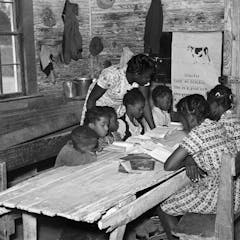
Articles on US education
Displaying 1 - 20 of 118 articles

A tradition of nonpartisanship on locally elected school boards is changing, following a national shift toward divisive political partisanship.

As the nation marks the 70th anniversary of Brown v. Board, one of its most significant side effects − the large-scale loss of Black teachers − continues to affect America’s schools.

More than 3 million children in the US are homeschooled. Are they getting a good education?

Research has shown that anti-gun violence programs have more success when they address root causes such as generational poverty, easy access to guns and a lack of affordable housing.

Research shows that more children have handled household guns than their parents think.

A scholar on racism weighs in on a recent court decision that upheld a school’s decision to punish a Black male student for wearing his hair in long locs.

Cybercriminals target schools because they’re uniquely vulnerable. A cybersecurity expert explores whether a new White House initiative will be enough to deter bad actors.

Rather than have students memorize names and dates, this history curriculum invites students to grapple with real-life issues faced by people from the past.

The opt-out movement caught on heavily in Colorado in the late 2010s. A group of education scholars is exploring the reasons why.

Migrants to the US say they need a map to help them navigate the world of higher education.

Policymakers and others often invoke the 1957 Russian launch of sputnik when trying to spark a discussion about education reform. A rhetoric scholar examines how often they succeed.

During the civil rights era, Black teachers were valued members of the community and often taught generations of family members.

With Donald Trump absent again, Republican presidential hopefuls took potshots at each other but agreed that Bidenomics isn’t cutting it.

Two education researchers reviewed the evidence on year-round school. Here is what they found.

While a Florida curriculum implies that enslaved Africans ‘benefited’ from skills acquired through slavery, history shows they brought knowledge and skills to the US that predate their captivity.

The 2023 Global Education Monitoring Report proposed restrictions on the use of technology in the classroom.

Could a 10-minute meeting between teachers and principals reduce teacher turnover? A researcher explores the possibilities.

New research on school superintendent turnover rates reveals that divisive political issues are contributing to the problem of instability among school leadership across the US.

Parents who had positive experiences in school often select schools for their children that are similar to the ones they attended – but if they had a bad experience they avoid those kinds of schools.

Polarization among the public and politicians threatens to undermine educational progress made over the past few decades.
